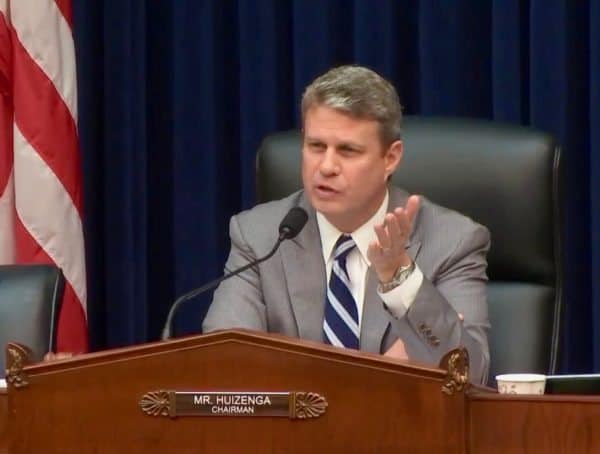House Representative Bill Huizenga of Michigan told Bloomberg July 27th that American regulations may need to be modernized to support crypto industries and ensure that retail investors get a piece of the action.
“We’ve seen so much more of the capital getting locked up into private hands. It’s been harder and harder for ‘Mr. and Mrs. 401K’ to invest. Retail investors are a key priority,” he said.
Huizenga is a Republican. He leads the House Financial Services Committee’s Subcommittee on Capital Markets. Bloomberg believes he may seek to Chair the committee if the Republicans win another congressional majority in the fall.
Like many other government officials, Huizenga talked a fine line between investor protection and industry growth, but also characterized current regulations as outdated.
“How do we make sure that investors and entrepreneurs and innovators… graduate into a publicly-held company, a partial-IPO or whatever?”
At issue is the Howey Test, a 1946 law which established that a security (investment product) is, essentially, anything sold with the expectation of profit resulting from the efforts of a third party.
The issuing of securities in the US is fairly strictly governed. But the creation of ICOs (initial coin offerings) around 2005 has since allowed thousands of companies to skirt securities regulations and to raise millions and sometimes billions directly from investors. All they have to do is go to a portal on Ethereum and, voila- digital token.
ICO purveyors believe their products fall into a regulatory grey area because, they claim, their digital tokens will eventually function as a way to access certain digital services that they plan to build with the funds raised.
The purported dual nature of ICOs (not exclusively securities) has confused regulators and investors alike, including Huizenga:
“That’s pretty muddied yet. The SEC and the CFTC…everybody’s trying to figure out whether its fish or fowl. Turns out it might be a kind of a platypus. It’s kind of an unknown, or something in between. How do we deal with that to make sure that we’re maintaining investor security and…protecting them properly, yet allowing the subject area to really hit it’s stride and grow? Because it’s going to be useful.”
One major problem with ICOs becoming evident in 2018 is most of the companies doing them raised money before they even had a working product or proof of market. The tradable tokens are issued and move on to exchanges for speculation, where they trade, sometimes for years, before the blockchain project they are tied to comes to market.
If, and when, the blockchain premiers (an estimated 90% of them never do), the product is unspectacular.
The Augur project, for example, launched this July and quickly proved that it is barely required.
 Augur, one of Vitalik Buterin’s darlings, is a hyped “decentralized prediction market” where people can use a specialized token (REP) to bet another specialized token (ETH) on the outcome of real world events.
Augur, one of Vitalik Buterin’s darlings, is a hyped “decentralized prediction market” where people can use a specialized token (REP) to bet another specialized token (ETH) on the outcome of real world events.
A few people are using the platform for sports betting and the like. The only unique “use case” for Augur now is the platform is allowing public bets on political assassinations.
Should such an “innovation” justify sweeping away the Howey Test?
In fact, most so-called “dual purpose” digital tokens like REP are proving largely useless for anything other than short term speculation in an overheated space. “The only innovation in crypto is the separation of money from unqualified investors,” says former Wall Street risk analyst and Bitcoiner, Tone Vays, who has also likened using dedicated tokens on their particular websites as “buying things on Amazon with Amazon stock.”
It’s absurd.
[clickToTweet tweet=”most so-called ‘dual purpose’ digital tokens are proving largely useless for anything other than short term speculation” quote=”most so-called ‘dual purpose’ digital tokens are proving largely useless for anything other than short term speculation”]
A digital token is largely a cart before a horse, and nobody needs either.
Representative Huizenga also mentions “blockchain”:
“We also know that blockchain technology is going to be very useful in different applications. So how do we make sure that regulators are viewing these things through a modern lens?”
Since the invention and release of the Bitcoin blockchain, which does work, many firms have sought to implement Bitcoin-style innovations as a possible way to enhance data management in private business.
A number “blockchain service” companies also ICO’d. Once again, the fundraise preceded product demand, and then the companies tried to force the product to work, which it very often doesn’t.
Many large firms have tested industrial blockchains, at considerable expense, and have walked away.
The current narrative in crypto for why these companies have walked is they are “old,” and “legacy.”
Congressman Huizenga is far from the only one confused, but it behooves us all to get ahead of this.
After Huizenga gave his thoughts on crypto, the conversation turned to the fallout from the 2008 Housing Crisis, when poor regulation separated middle-class Americans from 36% of their wealth.


